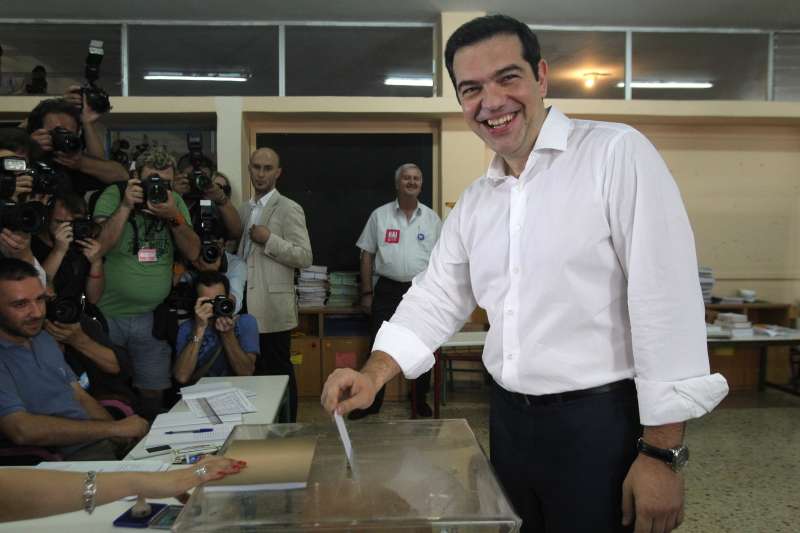Greece appoints new finance minister, creditors ponder post-No vote scenario….reports Asian Lite News
 Greece appointed a new finance minister after Yanis Varoufakis announced his resignation even as the country voted “No” to a bailout offer in a landmark referendum. Heads of European institutions held a teleconference to discuss the consequences of the historic vote.
Greece appointed a new finance minister after Yanis Varoufakis announced his resignation even as the country voted “No” to a bailout offer in a landmark referendum. Heads of European institutions held a teleconference to discuss the consequences of the historic vote.
Euclid Tsakalotos, the deputy foreign minister of international economic affairs and chief coordinator of the country’s negotiating team over the debt deal with lenders, replaced Varoufakis. He will be sworn in at the presidential mansion in the evening, an official announcement said.
In a posting on his website, Varoufakis said the decision was made in view of “a certain ‘preference’ by some Eurogroup participants, and assorted ‘partners’, for my ‘absence’ from its meetings”.
“Soon after the announcement of the referendum results, I was made aware of a certain preference by some Eurogroup participants, and assorted ‘partners’, for my ‘absence’ from its meetings; an idea that the Prime Minister (Alexis Tsipras) judged to be potentially helpful to him in reaching an agreement,” he said.
“For this reason, I am leaving the ministry of finance today.”
“I consider it my duty to help Alexis Tsipras exploit, as he sees fit, the capital that the Greek people granted us through yesterday’s referendum,” Varoufakis said.
Tsipras later thanked Varoufakis for his “ceaseless efforts” to defend the interests of Greece in negotiations with creditors, according to government spokesman Gabriel Sakellaridis.
Sakellaridis said the government would announce a new finance minister following a meeting between Tsipras and Greek political party leaders at the presidential palace, with the exception of the Neo-Nazi party, Efe news agency reported.
“The prime minister feels the need to thank him (Varoufakis) for his ceaseless efforts to promote the positions of the government and the interests of the Greek people under very difficult circumstances,” the spokesman conveyed.

Meanwhile, heads of European institutions, in particular the European Commission (EC), the European Council, the Eurogroup and the European Central Bank (ECB), held a teleconference on Monday morning to discuss the Greek situation in light of the country’s “No” vote in Sunday’s bailout referendum.
Presidents Jean-Claude Juncker of EC, Doland Tusk of the European Council, Jeroen Dijsselbloem of the Eurogroup and Mario Draghi of the ECB took part in the meeting, Efe news agency reported.
Juncker said he respected the decision of the Greek citizens, and explained the democratically elected leaders of the 18 countries of the Eurozone had been talking since Sunday night.
The matter will be further addressed on Tuesday before the European Parliament in Strasbourg, France, according to the EC president.
Meanwhile, Dijsselbloem said that the result of the Greek referendum has been noted.
“This result is very regrettable for the future of Greece. For recovery of the Greek economy, difficult measures and reforms are inevitable. We will now wait for the initiatives of the Greek authorities. The Eurogroup will discuss the state of play on Tuesday, July 7,” he added.
In Paris, French Finance Minister Michel Sapin asked the anti-austerity Greek government to come up with serious and strong proposals to reach a crucial deal as the “No” vote in Sunday’s referendum “does not fix anything”.
“It’s up to the Greek government to make proposals now. The vote does not fix anything automatically. It’s a refusal of an attitude,” Sapin said.
Speaking to the local broadcaster Europe 1, Sapin acknowledged that “the thread of dialogue is very tenuous”, and urged Athens “to show that it is serious about negotiation and make serious and solid proposals” in order to bridge differences with its creditors and help the debt-ridden country get back again on its feet.
“There is a risk of leaving the euro but there is no automatic exit. In the same way, the vote doesn’t mean automatically that Greece stays in the euro. What will determine whether it stays or leaves is the quality of negotiations that will start,” the French minister added.
Sapin reiterated France’s stance to keep Greece among the member countries of the single-currency bloc, Xinhua news agency reported. He also pledged to help the left-wing Greek government to alleviate the country’s debt burden without giving accurate proposals.
In London, British Prime Minister David Cameron chaired a meeting of senior ministers and officials to assess the impact on Britain of Greece’s “No” vote on its austerity package.
Bank of England Governor Mark Carney and Chancellor George Osborne were present at the meeting.
The headquarters of the executive arm of the British government said in a statement that contingency plans were already in place following the “decisive” referendum outcome. BBC reported.
According to the BBC report, the British government could not “stand back” from events in Greece, with over two million Britons visiting the country each year and over 40,000 residing there.
Before the vote, Cameron had predicted Greece would leave the eurozone if it voted “No” because it would be a “very significant default and a very significant problem”, and the chancellor has warned Britain “cannot be immune” from the Greek crisis.